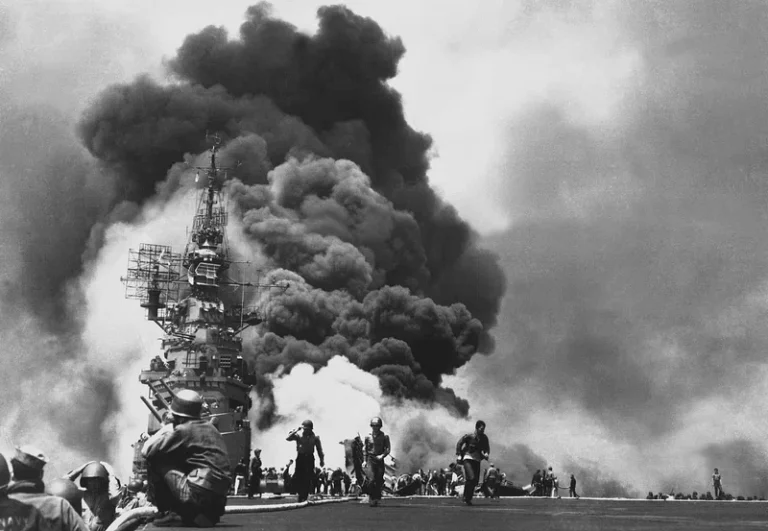Causes And Effects of World War 2
World War II stands as one of the deadliest conflicts in human history, involving over 50 countries and reshaping the global landscape. This war divided nations and exacted a heavy toll, with victory coming at a significant cost.

Overview of World War 2
This conflict, spanning from 1939 to 1945 surpassed its predecessor in both scale and devastation. World War 2 was fought between two alliances: the Allies, led by the United States, the Soviet Union, and the United Kingdom, and the Axis, spearheaded by powers like Nazi Germany, Italy, and imperial Japan.
Causes of WW2
It is hard to pinpoint an exact cause as multiple social and political reasons led to WW2. However, to get to the root of the problem we have to travel back in time to the post-World War 1 era. Although the 1919 Treaty of Versailles was to establish and promote peace the opposite happened as Adolf Hitler and the Nazi Party rose to power due to the severe reparations and territorial losses inflicted on Germany.
- Treaty of Versailles and its Impact
Despite the goal of the Treaty of Versailles being to avert conflicts, it had unexpected repercussions. Extremist ideas of being a superior race and restoring honor to Germany gained traction as a result of increased discontent among the population and widespread suffering due to Germany’s economic load.
- Economic and Political Repercussions
Due to the 1930s Great Depression, there was political upheaval and economic instability worldwide. This paved the way for authoritarian governments to rise to power as they used already existing tensions to promote promises of stability. Benito Mussolini built a fascist administration in Italy, whereas Hitler’s rise to power in Germany was aided by the country’s economic difficulties.
- Rise of Totalitarian Regimes
By the 1930s totalitarian governments had emerged at an alarming rate. Mussolini’s Italy, Hirohito’s Japan, and Hitler’s Nazi Germany all had expansionist ideas to alter the global map to their advantage. Germany was starting to annex its neighboring countries like Austria and Czechoslovakia in 1938 while Japan launched an invasion of China.
- Weaknesses in International Diplomacy
Without concrete proof of Hitler’s ultimate goals, politicians in the United States, Britain, and France were unwilling to take action to restrain his expansionism because they were preoccupied with their own economic issues during the Great Depression. Furthermore, Hitler having formed an alliance with Italy and Stalin’s Russia, led to failure in international diplomacy. The League of Nations, which was founded following World War I was no match for the Aggressor nations. Since these issues could not to solved amicably it slowly led to World War 2.
Events that Lead to the War
When Germany invaded Poland in 1939, it was the spark that ignited World War II. Then Britain and France officially declared war on Germany which started the conflict. While Germany was at war with Europe, Japan’s power grew in the Pacific.
By 1941, the Japanese had sent troops to Southeast Asia, invading European colonies which led to the British and US establishing an oil embargo against Japan. These Axis nations sought to rule the world, the conflict swiftly grew more intense.
Significance of WW2 in Shaping Global History
Sixty million people died during WW2 and sadly most of them were innocent civilians. The Holocaust stands as a reminder of the consequences of hatred and bigotry. Even after the war, most countries suffered from malnourishment and low male-to-female ratio due to the numerous deaths.
Additionally, this war saw technological advancements in the military including the development of atomic weapons. Its effects still reverberate in Hiroshima and Nagasaki.
- Global Economic Repercussions
The war might have ended the Great Depression but it left the world in shambles. Most of Europe’s major cities were not turned to rubble. This is why the Marshall Plan was initiated by the US to foster economic recovery. The North Atlantic Treaty was approved in 1949 which gave Western Europe military protection through America.
- Redrawing of National Boundaries
The outcome of WW2 resulted in the redrawing of the world map as Germany was divided into East and West, while Eastern Europe fell under the influence of the Soviet Union. The Yalta and Potsdam Conferences played crucial roles in changes to national boundaries. WW2 also marked the end of colonial empires for France and Britain as most of their colonies fought for independence.
- Emergence of the United Nations
The United Nations (UN) was established in 1945 due to the failure of the League of Nations. They aimed to be a beacon of hope to save succeeding generations, promoting international cooperation and addressing humanitarian issues. The UN still plays a fundamental role in upholding global peace and stability.
Legacy and Lessons for Preventing Global Conflicts
World War 2’s legacy is a stark reminder of the importance of diplomacy and the catastrophic consequences of dictatorship and militaristic movements. This war prompted a reevaluation of international relations and birthed establishments like the UN. It also made the United States and the Soviet Union dominant global powers.
The Nuremberg Trials had war criminals face accountability, and set principles for future disputes. The hard lessons learned from this war continue to shape modern politics and promote the world’s nations to prevent further conflict through peace.
Conclusion
Although WW2 ended almost a century ago, it left behind scars that remind us of the cost of aggressive nationalism and remind us the importance of fostering understanding between nations. It left an indelible mark, reshaping nations, economies, and ideologies.
Despite the tumultuous chaos that was World War 2, it also ushered in this new modern era where nations took a collective resolve to pursue peace and prevent history from repeating itself.
